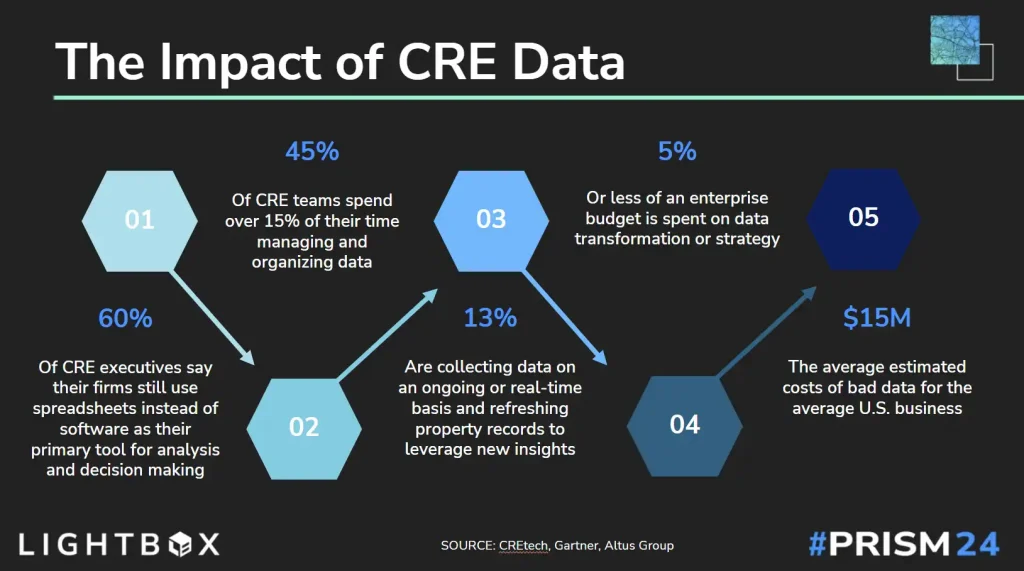“We’re sitting on an opportunity our predecessors didn’t have.”
-Patrick Jacolenne, DataLogIQ 360
At the LightBox PRISM 2024 conference, the spotlight was on building data bridges as the universe of property data grows exponentially. Industry experts gathered to discuss the critical challenges and promising opportunities presented by the digitization and modernization of collateral data. Patrick Jacolenne, Founder & Chief Data Strategy Officer at DataLogIQ 360, and Gabriel Byberg, Head of Technology Advisory for Americas Markets at JLL, provided key insights into the future of CRE data, the need for better data integration, and the exciting early applications of AI in transforming the industry.
The Future of CRE Data: Embracing Non-Traditional Data Sources
Jacolenne emphasized that the future of CRE data lies in harnessing non-traditional data sources. “Over the next decade, 60% of predictive power will come from non-traditional data sources and variables, like climate or flood risk data,” he stated. This shift highlights the importance of being able to harness and integrate diverse data points such as interior and exterior imagery, climate and weather risks, ESG (Environmental, Social, Governance) data, and demographic trends into property evaluations.
Jacolenne underscored the necessity for properties to adapt to these changes: “In a world of ever-increasing change, even the most established properties must adapt, or they become a canvas for disruption.” By leveraging these new data sources, CRE professionals can gain deeper insights and make more informed decisions, ensuring their properties remain competitive and resilient.
Data Integration is Imperative
Byberg discussed the critical need for better data integration within the CRE industry. “Centralized data allows for more efficient workflows and better storytelling about properties in what we’re telling our clients,” Byberg explained. He highlighted several startling statistics (see slide) and remarked that the current landscape, where many CRE firms still rely on spreadsheets, leads to inefficiencies and missed opportunities for comprehensive data analysis.

These figures underscore the critical need for building bridges between disparate data sets to streamline processes, improve deliverables and enhance the accuracy and utility of CRE data. CRE professionals and companies are just beginning to connect disparate data sets, which presents promising opportunities for both adding sophistication to client deliverables and real estate decision-making, as well as improving staff efficiency.
AI and Data Strategy: A Synergistic Approach
Both Jacolenne and Byberg stressed the importance of a robust data strategy as the foundation for successful AI implementation. “Your AI strategy is only as good as your data strategy,” Jacolenne noted. Byberg added that the power of AI lies in its ability to streamline information retrieval: “The power of AI allows us to use natural language ‘I’m looking for this’ and then gives you the information without having to look at multiple places.”
AI and tools like ChatGPT have the potential to revolutionize the CRE industry by automating mundane tasks and freeing up employees to focus on high-value strategic decisions. Byberg highlighted the positive impact this can have on talent retention post-COVID: “ChatGPT can serve everyone from the executive to the assistant. Empowering workers to do their job well by making their tasks easier is a strong retention strategy.”
Jacolenne also pointed out the advantages of integrating AI with current workflows, especially for companies with limited budgets. “For companies that don’t have huge budgets for technology, AI can level the playing field,” he remarked. Additionally, leveraging internships to tap into the innovative capabilities of students familiar with AI and ChatGPT can yield unexpected and valuable solutions. Moreover, both experts agreed that using AI like ChatGPT can uncover efficiencies, introduce new analytical tools, and expedite the transition from data gathering to actionable insights.
“Embracing tech innovation is not only a smart business strategy but also a crucial factor in attracting and retaining top talent in a competitive environment,” remarked Byberg. By embracing non-traditional data sources, improving data integration, and leveraging AI, CRE professionals can navigate the challenges and seize the opportunities that lie ahead. As Patrick Jacolenne aptly put it, “We’re sitting on an opportunity our predecessors didn’t have.”
